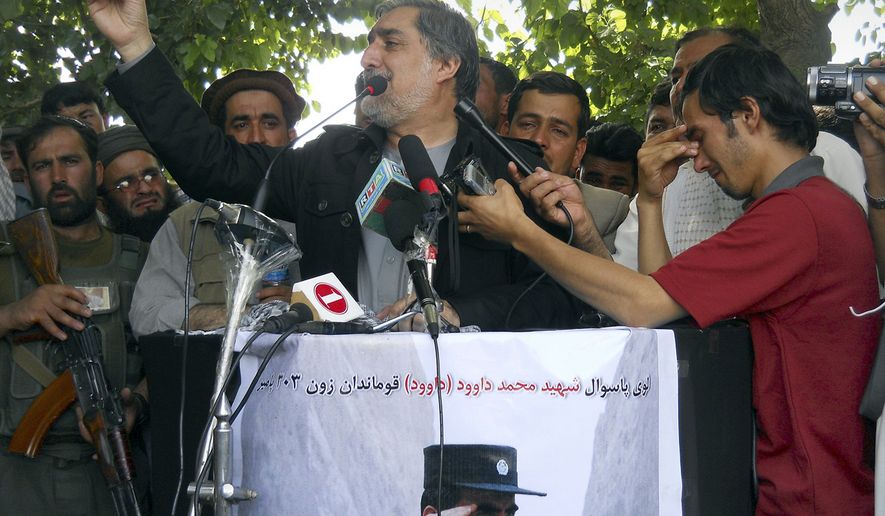A large number of Taliban and al Qaeda fighters “have lost all hope” and are seeking peace deals with the Afghan government since U.S. commandos killed Osama bin Laden last month, a senior Afghan official told The Washington Times this week.
He also confirmed reports that the United States has stepped up contacts with the Taliban, which sheltered the al Qaeda leader until U.S. forces toppled the brutal Afghan regime after the Sept. 11, 2001, terrorist attacks on the World Trade Center and the Pentagon.
Ghulam Farooq Wardak, Afghanistan’s education minister and a member of a peace council in charge of reconciliation efforts with the Taliban, described an “increase in the number of approaches” to the panel from militants since bin Laden’s death on May 2.
“They have lost all hope,” he said.
Mr. Wardak said Taliban and al Qaeda fighters have contacted Burhanuddin Rabbani, the council chairman and a former president of Afghanistan, but he declined to disclose more details of those meetings.
“Since these approaches are in the premature stage, we would like these contacts to be confined to him,” he said, referring to Mr. Rabbani.
Mr. Wardak was unable to say whether any senior commanders were involved in reconciliation efforts.
The Afghan government has set three conditions for reconciliation: The militants must lay down their arms, renounce al Qaeda and respect the Afghan Constitution.
Even as officials have stepped up diplomatic efforts to jump-start talks with the Taliban, the group has launched a deadly spring offensive to regain control of the country.
Taliban fighters and their al Qaeda allies fought a second day of fierce battles with Pakistani troops Thursday in one of the deadliest clashes in months.
Pakistani authorities said 63 people died when militants “attacked villages and burned schools” in a border area with Afghanistan.
In his interview with The Times, Mr. Wardak also accused Pakistan of providing safe havens for terrorists, citing the discovery of bin Laden in the city of Abbottabad, home to Pakistan’s main military academy.
“It’s as clear as sunshine,” he said in an interview in Washington.
“If Osama bin Laden was there, there could be second and third and fourth layers of terrorists there as well. He could not be standing alone,” he said.
He also confirmed recent contacts between U.S. officials and the Taliban.
In meetings with Obama administration officials, Mr. Wardak discussed U.S. and Afghan efforts to contact commanders of the Taliban, including the group’s one-eyed leader, Mullah Mohammed Omar.
The German weekly Der Spiegel reported last month that Germany had helped U.S. officials contact Mullah Omar’s personal secretary, Tayyab Aga.
In a major policy speech in February, Secretary of State Hillary Rodham Clinton said the United States is launching a “diplomatic surge” aimed at bringing about a political solution in Afghanistan that “shatters the alliance between the Taliban and al Qaeda.”
A key reason for Mr. Wardak’s visit to Washington was to persuade the Obama administration to avoid further budget cuts for education projects in Afghanistan. Last year, the U.S. Agency for International Development gave $145 million for education projects in Afghanistan. The funding was slashed to $95 million in the fiscal 2011 budget.
In his meetings with Secretary of Education Arne Duncan and USAID administrator Raj Shah, Mr. Wardak said he told them, “If you don’t pay proper attention to education, we may lose this success story.”
Mr. Wardak dismissed calls for an accelerated withdrawal of U.S. troops from Afghanistan by some members of Congress who claim bin Laden’s death ended the need for the U.S. deployment.
“The terrorist mentality can produce a number of Osamas. There may already be a number of Osamas,” he said.
Paul Pillar, a CIA veteran who served as national intelligence officer for the Near East and South Asia, said bin Laden’s death has provided a reason to hope that the Afghan Taliban leadership and Mullah Omar will find it easier to cut their links to al Qaeda.
“The previous relationship was more of a personal obligation and indebtedness to bin Laden than to the group,” he said.
Some Afghans are wary about efforts to reconcile with the Taliban.
Abdullah Abdullah, a former foreign minister who won 30 percent of the vote when he ran against Afghan President Hamid Karzai in the 2009 presidential election, has been a leading critic of the process.
In recent meetings with Marc Grossman, the U.S. special representative for Pakistan and Afghanistan, and other U.S. officials, Mr. Abdullah expressed concern about the effort to reach out to the Taliban.
“We are not against making peace; rather we are against the way in which they are proceeding,” he told The Times in a phone interview.
He was part of the Northern Alliance that helped U.S. forces topple the Taliban, which imposed a brutal form of Islamic law on Afghanistan from 1996 to 2001.
Mr. Abdullah said the Taliban has shown no sign of dropping its goal of re-establishing an Islamic emirate in Afghanistan.
“The minute the Taliban give up on the idea of establishing an Islamic emirate, they deny themselves the reason for their existence. This fundamental issue has to be understood while discussing the idea of reaching out to the Taliban,” he said.
• Ashish Kumar Sen can be reached at asen@washingtontimes.com.




Please read our comment policy before commenting.